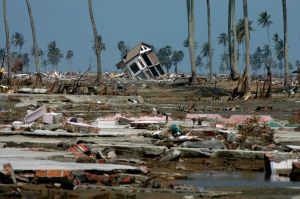
The face of disaster and crisis preparation is changing as freak weather events and hazards exemplify the consequences posed when we let our guard down to climate change.
There is a general, shared understanding among us all that climate change is expected to increasingly change weather patterns and events across the globe. However, it seems as though the reality that these effects are already taking place right before our eyes has not yet fully sunk in for policymakers, human services systems, and the general public overall.
Naturally, decision-makers seek reliable information regarding what types of weather events their region can expect, and prepare for in terms of impending, and future risks. But the unpleasant truth is that the effects of climate change are not only increasing the intensity and frequency of natural disasters, but are also opening up new and unsuspecting geographic areas to never-before-seen hazards.
One example of such an occurrence was the 2021 Texas power crisis, which displaced millions, and even killed hundreds of Texas residents while also resulting in massive financial losses. While Texas normally experiences, and thus, is prepared for a wide array of other hazards, such as cyclones, wildfires, and floods, just to name a few, the state’s power crisis resulted from an underestimation of climate change’s effects on hazards within the region, resulting in unpreparedness of their human services systems for atypical winter weather events.
The Texas power crisis is just one example of how decision and policy makers are underestimating the effects of climate change on natural disasters, leaving communities vulnerable to a wider array of prospective risks. We are now in an era where we are finally feeling the impacts of climate change, making it now necessary to expect the unexpected, and plan accordingly when it comes to disaster and crisis preparation.
Numerous studies have shown that people who experience and survive natural disasters are more likely to understand the devastation they cause, increasing the likelihood for them to be more prepared for future risks; but can we find a way to make unsuspecting communities less vulnerable to new hazards without having to actually experience one?
Roman Hoffman and Raya Muttarak, authors of the article, “Learn from the Past, Prepare for the Future: Impacts of Education and Experience on Disaster Preparedness in the Philippines and Thailand“, say yes, and their answer is to replace the experience of surviving a hazard, with education instead.
In their study, Hoffman and Muttarak lead a study where one vulnerable group was educated on disaster risks and preparedness, whereas the other group was not. Their reported results indicated that, overall, the group that was educated on disaster risk, showed much higher preparedness for hazards than the non-educated group.
The study clearly illustrates that proper education on the real consequences of natural disasters, along with how to properly mitigate, respond to, and cope with them, can aid in developing a proactive mindset to crisis response in a similar way to how first-hand experience does.
With this knowledge, we urge healthcare systems to implement comprehensive education surrounding disasters, their risks, and preparation. This education should include:
1. An exhaustive list of all potential risks, including, and especially, hazards which are historically uncharacteristic of the region
2. The implications of these risks on the surrounding populations and the human services systems which support them
3. Effective mitigation, response, and recovery strategies in the event that any unusual weather event or natural disaster occurs
Using past examples, including the Texas power crisis of 2021 along with others, health systems now have the opportunity to learn from their mistakes, and better prepare themselves for coping with the reality of our changing climate.
Looking for your emergency response or disaster relief healthcare staffing partner? Be proactive with your response to hazards by filling out our contact form and teaming up with Wellhart today!
